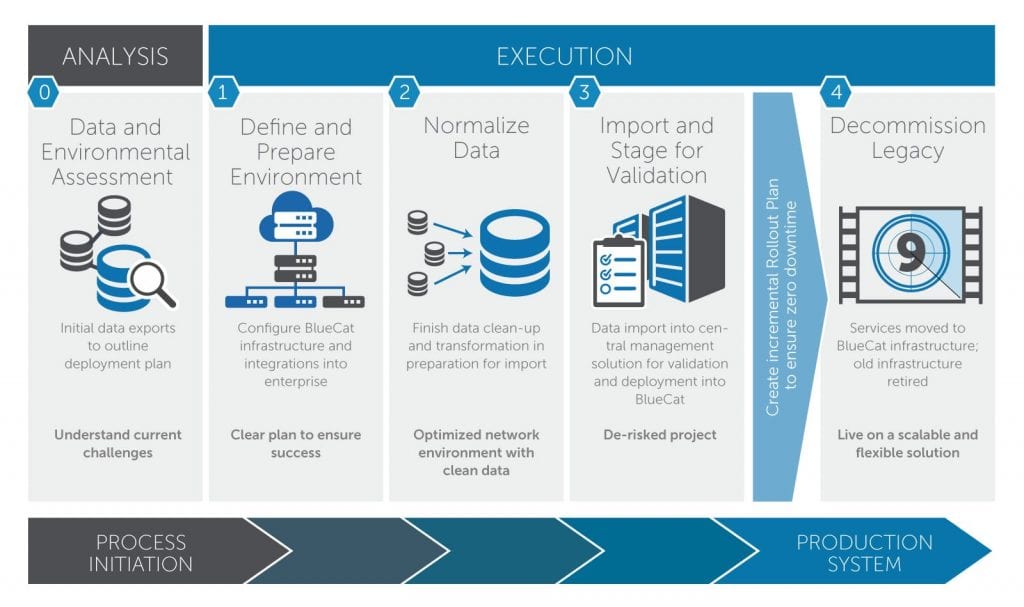Five reasons why BlueCat is your best bet for DNS

I’m going to give you five reasons why BlueCat is your best bet for DNS. Without further ado (or a fluffy intro)…
1. Customers have voted, and BlueCat’s the clear winner
I could just post the link to BlueCat’s score on Gartner Peer Insights and say nothing more. This is easily the most tantalizing reason to consider BlueCat for DNS management and security. They’re OBSESSED with customer success, which is why they’re the only DNS vendor who took home a Stevie Award in 2018 for customer service (they got six). There’s no question BlueCat is the DNS company of the people, for the people.
2. BlueCat knows QIP’s DNS strategy
BlueCat now employs the former directors of R&D and Product Management at QIP. There’s a ton of feature and architectural parity between BlueCat and QIP, which lessens the learning curve. The bonuses of BlueCat, which I’ll cover more in reason #3, include not having to maintain/update the OS and perform nasty, time-consuming updates. It’s so simple to patch on BlueCat, it’s almost worth the switch just for that value-add. By the way, patching is still important to security, so you can confidently tell your security team running their vulnerability scanners that you’re ON IT regarding DNS server patching.
3. BlueCat has elite expertise in QIP migrations

BlueCat has executed the largest QIP migrations on the planet. With zero downtime. Under budget. Before the project deadline. Brands you use, consume, wear, insure, and trust your money with every day use BlueCat after being with QIP for many years. BlueCat doesn’t just copy and paste the data into the new environment, it literally cleans up all data in your current environment through automated tooling and processes (to reduce risk and errors), tests, stagger cutovers (no need to do an all-or-nothing approach), tests, hand-holding through the cutovers, tests again, and seeing the project to flawless completion. I could talk about it all day. Back to point #1, the reason I can talk about this is because BlueCat’s customers are preaching it.
4. BlueCat adds more than just vanilla, watching-paint-dry DDI
The thing is, no one has a “DDI project” per se. Everyone has automation, security, cloud, and SD-WAN initiatives. Logically, you’d want your DDI solution to augment these big projects, right? That’s exactly what Adaptive DNS is about at BlueCat. DNS security, leveraging APIs to automate and reduce errors, standing up and taking down compute as needed – without human intervention – while maintaining visibility of said compute, and seeing every device and every query on the network all underpin what a 21st century DNS platform should look and act like. BlueCat just released a free version of its automation platform, and consistently adds new workflows (alongside our awesome customers) to GitHub for the greater good of the community. To use the most buzzwordy phrase of the year, we’re adding value to the community. We also helped remediate a zero-day threat in about 30 hours, which saved real dollars to the unnamed organization.
5. You’re looking for partnership, not just another vendor
DNS is inherently fragile. Issues will pop up, regardless of what platform you run. Who’s best equipped to answer the phone, hear and comprehend your concerns, cook up a solution, and deliver that solution hot and fresh to your inbox/phone/care portal in the least amount of time? Well, I’d contend the same customers that gave reasons #1 and #3 substance would argue BlueCat is that hero. In the time I’ve worked here and interacted with the team, I’d absolutely agree. Whatever goal is important to you personally, professionally, and corporately, BlueCat’s proven to be the peoples’ champ in partnership. If the technology is all relatively the same, isn’t this one of the most important variables?
By the way, BlueCat doesn’t just help QIP customers. Most people on BlueCat’s platform routinely transition from Windows. None of the above changes in this scenario.
It’s pretty clear I’m a sales guy with an obvious bias towards BlueCat in writing this article. The bottom line is the time to look for the next chapter after QIP is here. The narrative among industry leaders and users points to BlueCat being the heir to the DNS throne, and my hope is this article inspired some thought. If you have questions and don’t want to be sold to, let’s have a conversation.






